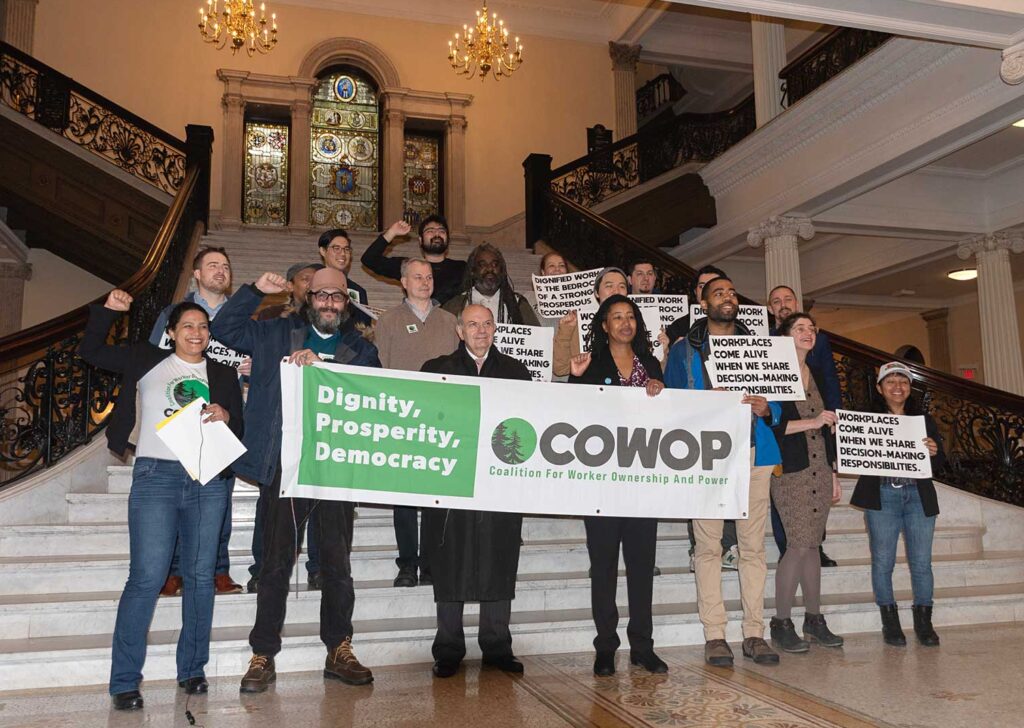
Worker-owned cooperatives have the potential to be a boon to Black employees.
That’s according to Nicole Obi, president and CEO of the Black Economic Council of Massachusetts, commenting on recent moves in Massachusetts to make it easier to establish employee-owned firms.
“Especially when you think about Black-owned businesses, most Black employer firms employ Black workers,” Obi said. “We think that this is a really critical way of doing wealth transfer and also keeping the employment levels in our community high.”
According to a 2022 census of employee-owned businesses in Massachusetts, 40% of the respondent worker-owned cooperatives — businesses where the staff that run the business are the people who own it — had a majority of workers/owners of color. Almost 60% were majority women or non-binary.
That is compared to about 19% of businesses generally in Massachusetts, according to data from the Minority Business Development Agency.
Obi said the current moment also presents strong opportunities for Black business owners, pointing to what experts call the “silver tsunami,” a wave of baby-boomer business owners who are planning to sell their small businesses in the next few years.
According to a September 2022 survey from MassINC Polling Group in partnership with the Coalition for an Equitable Economy — which includes BECMA — white business owners were about two times more likely to be looking to sell their company in the next few years and the founders or owners were almost 2.5 times more likely to be planning to retire within five years.

Darnell Adams, a worker-owner at Firebrand Cooperative, speaks at a press conference in support of increased funding for the Massachusetts Center for Employee Ownership, a piece of the state government formed by 2022 legislation that focuses on worker-owned businesses. BANNER PHOTO
Obi said she views employee-ownership as a “pretty compelling” way to keep those small businesses open to both serve communities and employee community members.
Members of the Coalition for Worker Ownership and Power have been pushing for an expansion of worker-owned cooperatives, this year advocating for increased funding for the Massachusetts Center for Employee Ownership in the 2025 state budget.
Supporters say that funding would serve as an investment to support business locally.
“I think about this funding in terms of investment that will come back to the Commonwealth. You’re investing in folks and businesses that have an idea for goods and services, etc., that are needed in their communities, they’re based in their community,” said Darnell Adams, a founder and worker owner of Firebrand Cooperative, a worker-owned consulting firm focused on co-ops and nonprofits.
The group is pushing for $685,000 in funding for the center, which would be used to guide start-up worker-owned businesses, provide training to existing ones, as well as support the purchase of small businesses by their employees as baby boomer owners look to retire. MassCEO was created by state legislation in 2022, following advocacy from the coalition.
Worker-owned ventures offer a chance for communities of color to expand access to business opportunities, as an area where marginalized communities are strongly represented.
“I don’t think you can understate the significance of worker cooperatives in particular, but employee ownership broadly has an impact on BIPOC folks and folks who are in marginalized communities,” said David Hammer, executive director of the ICA Group which was contracted to administer the Center for Employee Ownership. “If you’re a low-income person, good luck trying to buy a house, right? Employee ownership though, that becomes the basis on which you can start building assets, start building savings.”
Adams said she thinks conferences for worker-owned businesses are visibly more diverse than others like conferences for consumer-owned cooperatives — businesses like credit unions or REI, where members who purchase goods or services own the company.
“There were translators there on every call or every meeting, there were way more people who were brown and Black, people who were undocumented for instance, but had created a co-op as well,” Adams said. “It just felt like there was much more, a much bigger container.”

Sen. Lydia Edwards pledged to support the Coalition for Worker Ownership and Power’s ask for $685,000 in state budget funding for the Massachusetts Center for Employee Ownership. The Center, which was formed in 2022, has goals of supporting growth of existing worker-owned businessses and the creation of new ones. BANNER PHOTO
Sen. Lydia Edwards, who spoke at a February press conference organized by the coalition and promised her support for the funding request, pointed to worker-ownership as a way to push back against exploitation, particularly as the gig economy expands.
“There’s no business entity more creative and more attuned to the unique needs of a community down to the street level than a co-op,” Edwards said. “That’s why, when the state is going to give out money in the hundreds of millions of dollars to generate our economy, if you truly want to get to grassroots organizing, if you truly want to get to grassroots impact, you have to support co-ops.”
Supporters say worker-owned businesses also tend to lead to greater involvement in and support for the communities in which they work.
Adams said that following one of the seven principles of cooperatives as defined by the International Cooperative Alliance, which prescribes “concern for community,” the team at Firebrand Cooperative have turned down opportunities because they didn’t reflect community values.
A state office focused on employee ownership was first formed in 1989 during the Dukakis administration to work to combat deindustrialization. Then called the Massachusetts Office of Employee Involvement and Ownership, it focused on support of companies with employee stock option plans — an employee benefit plan that enables employees to invest in shares of the company where they work — as well as a census of companies with those ESOPs.
Funding for that office ended in 2008, leaving the state without a dedicated office to support worker-ownership until legislation signed by then-Governor Charlie Baker formed MassCEO in 2022.
Since then, the office has regularly received about $150,000 annually in the state budget, enough to tackle some efforts especially worker-owned businesses as a solution to the so-called “silver tsunami.” That funding, however, has not been enough to tackle the office’s broader agenda focused on supporting nonprofits that help start new worker-owned businesses and providing support and training to existing companies.
The $685,000 that the Coalition for Worker Ownership and Empowerment is pushing for would help start the early stages of those new thrusts of work, Hammer said.
Adams said she hopes MassCEO, with increased funding, can help support and stabilize the economy of worker-owned businesses in the state. She also said the office could be an important tool to help inform more people about the model of worker-owned businesses.
“The dream that somebody has of doing something, they might find out that this route is a way to actually get them there,” Adams said.






